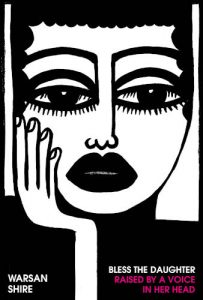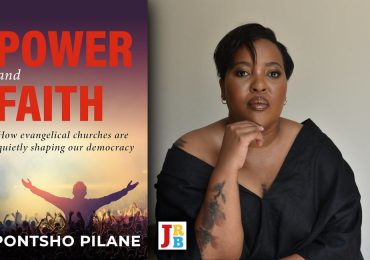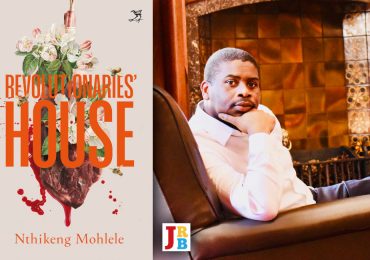Lebohang Mojapelo speaks to Warsan Shire about that Beyoncé moment, the importance of bearing witness, and her new book, Bless the Daughter Raised by a Voice in Her Head.

Bless the Daughter Raised by a Voice in Her Head
Warsan Shire
Chatto & Windus, 2022
Lebohang Mojapelo for The JRB: Congratulations on your new book. It’s your first full book, right, the other ones were pamphlets? How does that feel, finally having the work as a book?
Warsan Shire: I really purposely took my time. The chapbook ‘Teaching my Mother how to Give Birth’ came out like ten years ago and since then I was just thinking about my full collection. The second I finished my chapbook I was just like, I want my book to be something I’m proud of. So yeah, it feels really good, it feels lovely.
The JRB: I’m glad, and I can sense that it is an extension of the chapbook because some of the poems are the same, like ‘Home’, and others are extended or written differently but with the same tone. Which makes it feel both new and familiar.
Warsan Shire: Yes, I wanted it to feel like an extension of this chapbook because it is still in the world that I’m exploring in terms of ideas and themes, so at times I felt like it was taking a million years but I’m so glad I took that time. I feel like I grew up a lot and was able to kind of see things from the other side by the time this collection would come out.
The JRB: I’ve been an avid reader of your work for a long time, I saw you when you came to Johannesburg which was years ago!
Warsan Shire: Yessss! I had a great time. That’s so amazing that you were there, and we actually got to meet, kind of.
The JRB: Yes, I saw you on stage, and it was very exciting at the time. But the more exciting thing was: Beyoncé. We were Warsan fans and loved your work and we woke up one day and Lemonade was out, and Beyoncé was reciting your words. Tell me about that moment.
Warsan Shire: So, like, the feeling that you had, which is ‘this is kind of surreal’, was that multiplied by a million, that’s how I felt. But obviously I had to keep it to myself and keep it secret and at times I felt I was in some kind of psychosis and I’m imagining this. Especially for our generation, Beyoncé represents all things cool and for me she was always like that older sister I never had: beautiful, talented and inspiring. I think we all see Beyoncé in the same way. So I had to pinch myself because it was like a dream. But as time has gone by it was such a lovely experience and looking back on it now it starts to feel a bit more like: that was really cool, I can’t believe that happened.
The JRB: That’s a great way of putting it in terms of how we all grew up with Beyoncé, which also brings me to the popular culture references in the collection. I was reading them, and thinking, did we have the same childhood? The way you talk about Dawson’s Creek, Baby-Sitters Club, and ‘My loneliness is killing me’ Britney vibes.
Warsan Shire: Exactly! I think it’s so amazing, I meet so many people who are from our generation who grew up with these pop culture references and are black, and it’s so interesting how it kind of shapes our identity. Because there was so little representation back then and I remember reading a lot of adult or teen romance books and could never really imagine myself in those stories. Until I watched a film like Love Jones and I was like ‘oh my god’.
I really randomly grew up in London and grew up in a part of London which had almost no white children in it, so it was fascinating to watch these television shows and read these books that were filled with white characters. And how it affects your view of your life, wanting to be like the kids that looks happy on TV or the back of the cereal box or … it made my life feel very bleak and hopeless, and I’m sure many of us relate to that in different ways.
I remember an older cousin of mine would come over from Amsterdam and she was wearing her hair down and I was surprised because I used to think that was only for white people and that the rest of us had to put our hair up. I was very young, but it shows you that in my brain beautiful was related to white people, and then all things kind of conservative and struggling was for the rest of us. So, I realised from a young age that there are certain groups of people just constantly struggling and I would watch Dawson’s Creek and read Baby-Sitters Club and just think in comparison. And getting older and realising where all these little messages were coming from and it’s white supremacy.
The JRB: You reference ugliness a lot, I feel like its something that you talk about throughout the collection from when you were young, as you write in the first poem:
‘Are you there, God?
It’s me, the ugly one’
What is your relationship to ugliness now, now that you have a clearer idea of the way the world works?
Warsan Shire: For me, my low self-esteem came from my experience of childhood abuse. Within me I still identify with that ugly child. I was never really bullied at school, I was bullied in the home. I was abused regularly so it would be very difficult for someone who was raised like that to have good self-image. You can be abused as a child and you continue to feel ugly inside, like an outcast, feeling a little bit strange and not fitting in, and for me I choose to use those things that were considered ugly. I find hope in the super uncomfortable, taboo-to-talk-about, ugly things. I like digging into all of that. In my household there was texturism, as I had curlier hair compared to everyone and was constantly told ‘you need to do something about your hair’. So I had to go on my own journey of understanding what it means to be black. I had to fall in love with my natural hair and go on a natural hair journey, before YouTube was doing it. I was also on diets, I abused diet pills and was constantly abusing myself. Working through that and now being an adult I realise that we all have some form of ‘ugliness’ we battle with and through which we damage ourselves in different ways.
The JRB: One of the things you do, and I’ve been noticing it a lot with young black women writers of poetry—Ijeoma Umebinyuo, Upile Chisala, Koleka Putuma—is writing about mothers and grandmothers and women around them. It is like this process of witnessing what these other generations have been through, watching what was happening and speaking to it, and kind of trying to hold and understand their experiences in the present and in relation to yourself. Which is what you do with your mother.
Warsan Shire: I mean, my chapbook was literally titled ‘Teaching your mother how to give birth’. I talk about my mother, always! For me that is the relationship that has affected me the most. For most of us, if you feel loved by them, it steadies you through life. It gives you a sort of balance. But if you feel the opposite, it can make you dangerous, or it can make you feel miserable. My mother wasn’t particularly maternal, I don’t even know if our mothers had a choice in family planning. Was it their choice to have children? If they were our age would they have chosen to be mothers? Our relationship is an interesting one because I always felt like a mother and like she was my child and I had to take care of her and prioritise her feelings. So it’s really important to explore and interrogate that mother wound, it is like your first heartbreak, it shapes how you approach life, how you approach yourself and how you approach other people. But not having my mother around in the way that I wanted or needed made me rely more on my imagination, so ultimately it helped me become a writer.
The JRB: And that’s what you talk about in the title and title poem: raised by the voice in your head.
Warsan Shire: Yes, and for a lot of us, not only did we raise ourselves we raised our siblings. We had to be carers, and it was our job, it was our responsibility, especially if you’re the daughter or the eldest child. As I said, what happens in our childhood shapes us a lot, and this is an extreme example, but serial killers talk a lot about their dysfunctional childhoods, and when I think about it I’m always like, at least I didn’t turn out that bad, I could have been a serial killer, but I’m just a poet, that’s okay, not too bad [laughs].
The JRB: You obviously write a lot about being a refugee, migration, and a lot of the stories of your father and other people in your family. What is your relationship to Somalia like? How do you view it and feel towards it? You didn’t grow up there but it’s a place you know through your family, and you speak on that a lot in the collection.
Warsan Shire: My father was a writer, he was a journalist, so the way the war affected him was really bad. When we got over to the UK I was a year old and my mum was pregnant with my brother, she was really young. My father had had a thriving career in journalism, he was a star, writing the most cutting-edge stories about his country. So when we came to the UK the things he brought with him were newspapers, articles, photographs of Mogadishu, which is the capital city of Somalia, before and after the bombings, and he blew them up and created a form of museum of before and after the war. He never let us forget it, he gave us the dates, the places, the moments, and more, of this history. So even though I didn’t have much of that connection I grew up feeling like I had one foot there and one foot here. I didn’t manage to visit until I was about twenty-five, when I was in Kenya, and my friend was living there at the time and she said, do you want to come over for a few days? I enjoyed it, and I got to see where my blood comes from. But it was bittersweet because it is different now, and my memory of Somalia is in the old photographs from my family in the seventies, when things were beautiful, high-life time, really wonderful, and even in intra-Africa relations we were really good to each other and connected. The seventies in Africa were really beautiful for a lot of countries.
The JRB: I enjoyed the biblical/religious tone that you use in this collection—one of blessings and anointing saints. It seems as if you are staging redemption for many of the women you write about: Khadija and her suicide, Yosva and the cancer, Hoyo, and Victoria. One of my favourite poems in the collection is the one about Victoria, ‘Victoria in Illyin’ and I was just reading the background to the story, she was a young girl who was abused till she died at the hands of relatives.
Warsan Shire: It is my responsibility to bear witness. You know, when they say ‘raise awareness, raise awareness’, no, I want to bear witness, I want to memorialise so that it is not forgotten or in vain. Victoria is someone that I grew up hearing about in the news, and at the same time I was being raised by relatives and I remember thinking that children are so vulnerable, your fate depends on whose hands you end up in and no one knows. So I have always carried her with me and for me that’s probably the most important poem in the book. Bearing witness and memorialising her but also taking a moment to bless her.
The JRB: Slightly similar is what you do for your mother as well, when you tell her: ‘I’ll rewrite this whole life and this time there’ll be so much love … I can make us loved, just say the word’. There’s a lot of sadness and pain in a lot of this collection but I enjoy that you create and imagine a different past or future for those painful moments.
Warsan Shire: There’s such a transformative power in sharing these stories and letting it out. Sometimes we can feel so invisible or forgotten and it’s like no one even knows us, so I had to definitely inject that feeling of hope at least once in the book. To stand and say, this was wrong and it was not supposed to be this way, and allow ourselves to imagine something different, even if it is not true, that allows us to live with some form of hope and knowing that we are seen.
The JRB: Finally, do you find poetry to be an intervention for you, in dealing with your mental health? You do write about your experiences with bulimia, and OCD.
Warsan Shire: Yes, it has always been a lifeline for me, very therapeutic, very cathartic, just a way to stay in connection with myself. It’s the way that I heal myself and I’ve always used it in that way.
- Lebohang Mojapelo is an editor, writer, researcher and poet based in Johannesburg. Follow her on Twitter.





